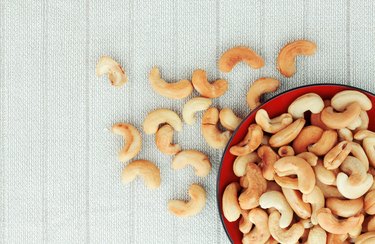
Creamy and mild, cashews are easy to love and hard to stop eating. While the list of cashew nuts' health benefits is long, there is one main disadvantage: Cashews are high in fat and calories, and eating too many can lead to weight gain.
Disadvantages of Cashew Nuts
Video of the Day
When consumed in moderation, cashew nuts are a nutritious addition to your diet. Like all nuts, they are a good source of healthy fats, fiber, protein, vitamins, minerals and antioxidant phytochemicals, according to a research review published in Nutrients in December 2017.
Video of the Day
But like all nuts, cashews are high in fat, which makes them high in calories. Fat is a more concentrated source of calories than carbohydrates or protein, so you can only eat a small amount at one time; one serving of nuts is 1 ounce.
One ounce of cashews — about 18 medium nuts, according to Cleveland Clinic — has 157 calories. That's not a huge amount — about 8 percent of the total daily calories for a typical 2,000-calorie diet. However, it's very easy to eat more than 18 cashews in one sitting without even realizing it.
This can quickly increase the calories in your snack and make up an even greater portion of your daily calories. For example, if you ate 3 ounces or 5 ounces of cashews at once, that would be 471 or 785 calories — 23.5 or 39 percent of a typical 2,000-calorie diet.
Unless you are carefully watching your intake of other foods, consuming all those cashews means you're going to exceed your calorie needs for the day. Doing that leads to weight gain — the more calories you eat in excess of your body's daily needs, the more weight you gain.
Read more: 4 Reasons Why Nuts Can Help With Weight Loss
Cashews Compared to Other Nuts
So, how do cashews stack up to other nuts? They are all fairly equal, although there are some notable differences. Cashews have slightly less protein than almonds and walnuts, and slightly more carbohydrates in the form of natural sugars, according to USDA data.
Almonds have a few more calories, with 162 per ounce, but they also have more fiber — 3.5 grams per ounce compared to less than 1 gram per ounce of cashews. Dietary fiber offers many health benefits, from helping control weight to lowering cholesterol. Increasing your fiber intake may help reduce your risk of heart disease, diabetes, constipation and colon cancer, according to UCSF Health.
The balance of fats is also different, with cashews having more saturated fat than almonds and walnuts, which are both higher in unsaturated fats. However, this doesn't likely affect the health benefits.
Saturated fat gets a bad rap, but the concern is mostly with animal fats, which have longer chains of carbon atoms. Longer-chain saturated fatty acids are associated with an increased risk of heart attack, but shorter-chain fatty acids have an inverse association, according to a study published in the International Journal of Cardiology in March 2019.
The bottom line? As long as you eat cashews in moderation, they are very healthy for you. But as with all foods, variety is key to getting the broad spectrum of nutrients, so mix it up with almonds, walnuts, pecans, hazelnuts and Brazil nuts every once in a while.
Read more: Healthy Nuts That May Help You Live Longer
- Nutrients: "Nutritional Composition of Raw Fresh Cashew (Anacardium occidentale L.) Kernels From Different Origin"
- Cleveland Clinic: "Nutrition: Nuts & Heart Health"
- USDA FoodData Central: "Nuts, Cashew Nuts, Raw"
- USDA FoodData Central: "Almonds, Unroasted"
- USDA FoodData Central: "Walnuts, NFS"
- UCSF Health: "Increasing Fiber Intake"
- International Journal of Cardiology: "Consumption of Individual Saturated Fatty Acids and the Risk of Myocardial Infarction in a UK and a Danish Cohort"